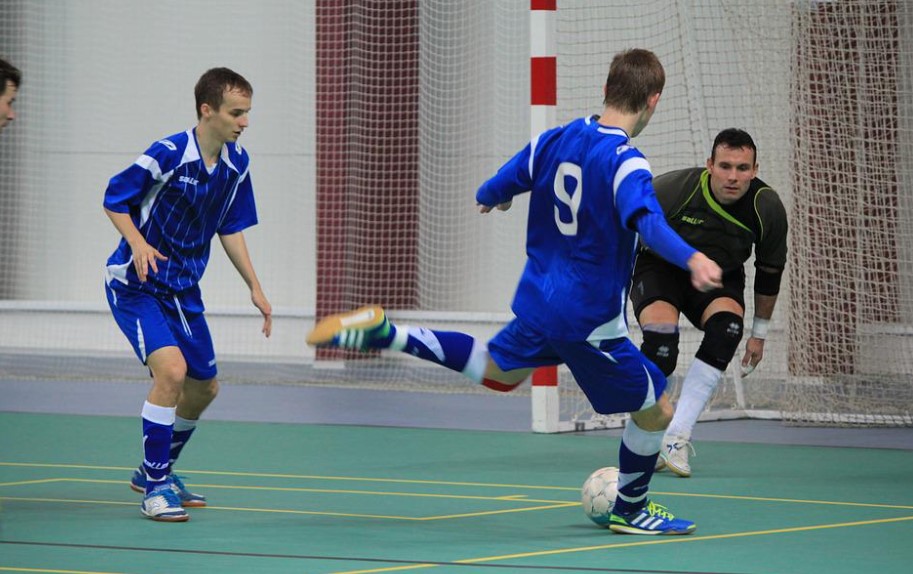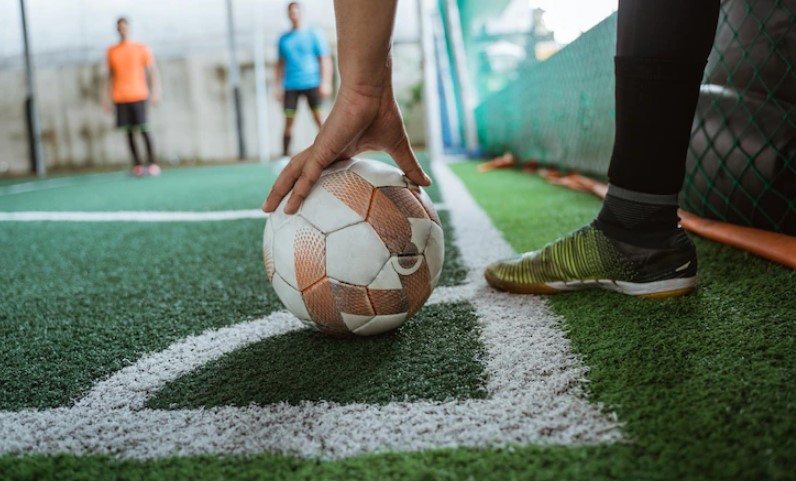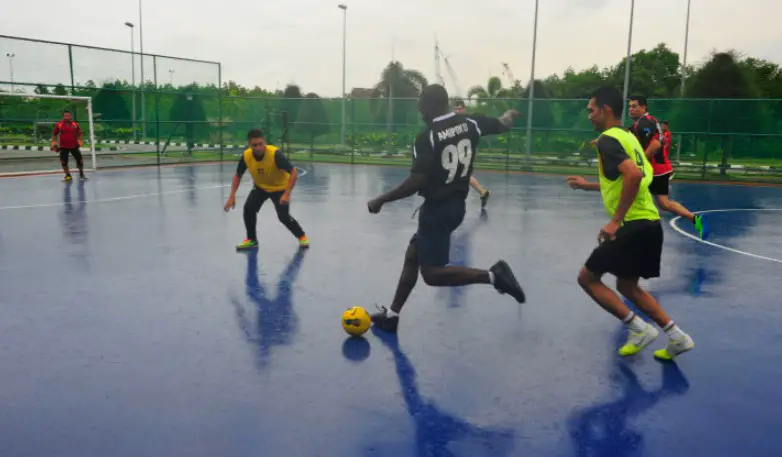Last Updated on October 4, 2023 by Alex PT
Futsal players may not prefer football leagues because of the different skill sets required, physical demands, and career paths. According to a 2020 study, 87% of futsal players believe the sport has improved their football skills, but only 35% have aspired to play professional football.
Why don’t skilled futsal players prefer performing in football leagues?

- Different Ball Sizes and Weights
The size and weight of the ball used in futsal and football are different. Futsal uses a smaller and heavier ball that stays close to the ground most of the time. This changes the dynamics of game-play significantly, and futsal players might struggle with the lightweight and bigger size of a football. - Different Game Play Tactics
Futsal lays great emphasis on ball control, quick reflexes, and improvisation under limited space. On the other hand, football requires longer passes, cross-field moves, and more emphasis on structure. That difference in tactical approaches might be challenging for a futsal player transitioning into football. - Varied Player Positions
Futsal does not have defined positions for its players like football. The free-flowing nature of the game allows players to interchange positions during a game. This contrasts starkly with the well-defined roles in football, which demands positional discipline from players. - Skill Transfer Difficulties
Not all skills from futsal translate well into football. For example, the unequivocal emphasis on footwork in futsal does not have the same level of importance in football. This can make the transition difficult for futsal players. - Change In Playing Surfaces
Futsal is played on a hard court surface, which impacts ball behavior, necessitating a different approach in mastering ball control. On the contrary, football is played on a grass field where the ball roll is quite different, which could be difficult for futsal players to adapt to. - Cultural and Personal Preferences
Some futsal players might simply prefer the fast-paced, high-scoring nature of their original sport. The cultural significance of futsal in some countries is high, and players might not wish to move away from it.
| Factors | Futsal | Football |
|---|---|---|
| Ball Size and Weight | Smaller and Heavier | Larger and Lighter |
| Game Play Tactics | Emphasizes Ball Control, Quick reflexes, and improvisation. | Emphasizes Long Passes, Cross-field moves and structure. |
| Player Positions | No Defined Positions | Well- Defined Positions |
| Skill Transfer Difficulties | Not every skill can be transferred to football. | Certain skills like footwork are less important than in futsal. |
| Playing Surfaces | Played on Hard Court Surface | Played on Grass Field |
| Cultural and Personal | Some players prefer the fast-paced nature and high-scoring game. | Football is usually slower-paced with less scoring compared to futsal. |
What is futsal football?

Popularly called ‘the 5 aside game’, futsal football is a form of indoor soccer officially endorsed by FIFA in the 1980s. It is a small-sided game consisting of just five players on each team. Futsal football is played with touchline boundaries on a hard-surfaced playing field the size of a basketball court. Interestingly, this version of football is played across the globe and it is a suitable game for regular football players to refine their magic touches and maintain their control skills. Futsal football is officially played by over 12 million players across 100 countries in the world. This sports game has proven to be a great skill developer as legendary superstars like the great Pele, Zico, Lionel Messi, and Kaka gave credit to futsal football for its contribution to their skill development.
What’s the difference between futsal and regular football?
Futsal football and regular football are two games of the same family but require a different skill set to play. Both sports share complementary characteristics but are fairly different in terms of format and gameplay. The football rules and regulations are applicable to both sports but there are slight adjustments in how the rules are applied for either sport.
For clarity, below is a table showing a few highlighted differences between distal and regular football.
| Futsal football | Regular football |
| Only 5 players are fielded in each team. | Each team consists of 11 players. |
| Playing field is relatively small in size. | The Pitch is larger and wider. |
| It requires skills and tricks. | Skillful displays are not necessarily required. |
| The futsal ball is small and heavy. | Regular football is of a standard size. |
| The playing field is made up of a hard-surfaced gymnasium floor. | Regular pitch is made up of natural or artificial turf, usually green in color. |
| The total duration is 40mins with 20mins each for both halves. | Both halves of regular football are 45mins, making it 90mins in total. |
| Unlimited substitution is allowed. | Substitutions is restricted to 3 or 5 per game. |
| A flurry of goals is a usual occurrence in futsal football. | Goals are limited due to a larger field of play and various tactical formations. |
How is futsal better than walled soccer?
Futsal offers several advantages over walled soccer (indoor soccer played with walls). Here are the key reasons why some people consider futsal to be better:
- Skill Development: Futsal emphasizes individual skills like ball control, dribbling, and passing due to the smaller and smoother court. Players have more touches on the ball, leading to faster skill improvement.
- Tactical Awareness: Futsal encourages quick decision-making and tactical awareness because of the smaller playing area. Players need to adapt to tight spaces and fast transitions.
- Improved Ball Control: The smaller, weighted futsal ball and lack of walls promote better ball control and technique. Players develop a better touch and feel for the ball.
- Fitness: Futsal demands a higher level of fitness due to its continuous, fast-paced nature. Players build endurance, agility, and quickness.
- Injury Prevention: Without walls, there’s a reduced risk of collisions with hard surfaces, making futsal a safer option, especially for youth players.
- Teamwork: Futsal encourages teamwork, as players must work closely together to maintain possession and create scoring opportunities.
- Less Stoppage: In walled soccer, the ball frequently goes out of bounds, leading to more stoppages. Futsal offers continuous play, promoting a faster-paced and more engaging game.
- International Success: Futsal has gained popularity worldwide and is recognized by FIFA. National teams compete in international tournaments, further showcasing its appeal.
- Accessibility: Futsal courts are easier and cheaper to set up, making it accessible to a broader range of players and communities.
- Youth Development: Many youth development programs incorporate futsal to enhance young players’ technical skills before transitioning to outdoor soccer.
How does futsal promote better technique?
Futsal promotes better technique in several ways:
- Ball Control: The smaller, heavier futsal ball requires precise control, fostering a soft touch and improved ball-handling skills. Players must develop excellent control to keep the ball close and navigate tight spaces effectively.
- Close Ball Handling: Futsal’s smaller court size and the absence of walls mean players frequently encounter opponents in close proximity. This encourages players to develop close ball-handling techniques, such as quick dribbling and tight turns.
- Passing Accuracy: The confined space of a futsal court necessitates accurate passing. Players must develop precise passing techniques to deliver the ball to teammates while under pressure.
- Quick Decision-Making: The fast-paced nature of futsal demands quick decision-making. Players need to assess their options rapidly, choose the best course of action, and execute it accurately. This enhances their overall decision-making abilities on the field.
- 1v1 Skills: Futsal often involves one-on-one situations due to the limited space. Players learn to use feints, changes of direction, and quick bursts of speed to beat opponents, honing their one-on-one skills.
- Shooting Accuracy: Shooting in futsal requires precision, as there is less space to exploit. Players develop the ability to place shots accurately, improving their scoring capabilities.
- Defensive Skills: Defenders in futsal must rely on technique, positioning, and anticipation to win the ball from attackers. This sharpens defensive skills such as tackling and intercepting passes.
- Receiving Skills: Players must excel at receiving passes in tight spaces, which enhances their first touch and ability to control the ball effectively, even when it comes at them with pace.
- Teamwork: Futsal encourages short, quick passes and combination play among teammates. This promotes a strong understanding of teamwork and how to work together effectively on the field.
- Game Awareness: Futsal players develop better game awareness as they must constantly scan the court, recognize opportunities, and anticipate opponents’ movements in the limited playing area.
FAQs
We have a compiled list of frequently asked questions about why skillful futsal players don’t prefer performing in football leagues. Let’s check them out!
Is futsal football easier to play?
Not exactly! Rather than being an easier game, it is physically less demanding than regular football. That is why a lot of retired footballers excel at futsal football tournaments while futsal players find the transition into regular football leagues difficult.
What is the biggest difference between futsal and regular football?
Out of several differences between the two sports, the most significant one is the size of their respective field of play.
Can futsal be as popular as regular football?
No! Although futsal football has gained popularity since it was endorsed by FIFA less than 30 years ago, regular football remains the most populous sport globally.
Closing thoughts
Both futsal and regular football are challenging sports with obvious similarities and differences in terms of the skillset required to play either sport. Futsal players have the skills required to perform in the regular football league as long as they are ready to work on their strengths and stamina, which is an essential requirement to cope with the rigorous and physical demands of regular football.
We have come to the end of this write-up and We hope you find this article informative enough to answer your queries regarding the article topic. Don’t hesitate to contact us if you have more questions.
Thanks!
References:

Hi! I’m Alex PT. I hold a Bachelor’s degree in Sports Management from Indiana University and have over seven years of valuable experience working in a Sports Event Management Company. I founded SportBlurb with the passion for bringing you the latest, most insightful, and engaging content in the world of sports. So, whether you’re a die-hard fan or want to stay informed, I’ve got you covered!

